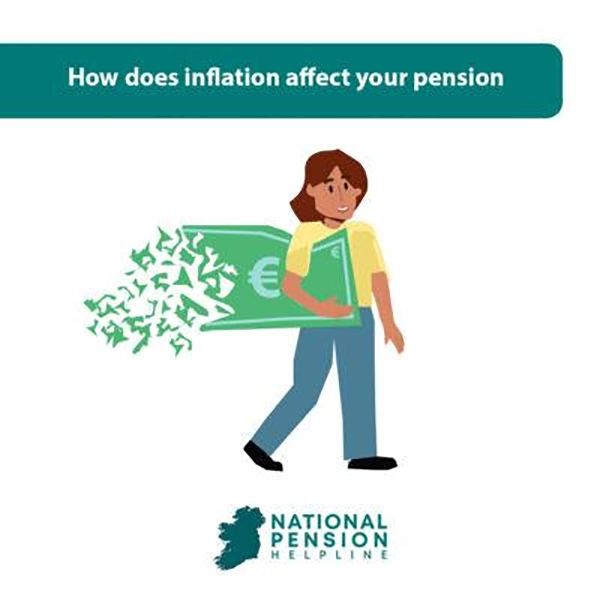KEY TAKEAWAYS
- Understanding the meaning of the inflation conceptually and economically.
- How can the impact of inflation significantly decrease the value of your pension?
- Explore the importance of diversification and regular financial reviews.
- Managing financial planning to counter inflation efficiently.
You must have heard “What you can buy today for ₹1000, you may have to struggle to buy that for ₹2000 tomorrow.” This is the power of Inflation! It can act as a silent killer to your retirement plans by decreasing your purchasing power over time.
This is why it’s important to consider inflation, especially when it’s about your pension, as for most people, their pension is their largest asset outside of their family home.
It is mostly front-page news about the inflation. Want to be on the safer side? Read more to know how inflation affects your pension and how to inflation-proof your pension strategy.

Before understanding how inflation affects the pension, let’s first understand what inflation is. The definition of the economy says that inflation is the increase in the average price of goods and services in terms of money. To measure this increase, CPI(Consumer Price Index) is used; when the price level in the market rises, then each unit of currency is worth fewer goods and services. This is how inflation works.
The common measure of inflation is the inflation rate, the annual percentage change in the general price index. Conceptually, inflation doesn’t mean a change in prices; it refers to a trend in prices. For instance, if consumers purchased more mangoes than apples, then the price of the mango would increase automatically. Such changes are not related to inflation; these changes are due to changes in consumer tastes.
The annual inflation rate in Ireland increased to 1.8% in June 2025 from 1.7% in the previous month, according to the data of the Central Statistics Office. The main reason for this increase in the inflation rate is the rapid increase in the price of food and beverages, recreation, culture, and communications.

With time, the state pension gets adjusted to allow for the effects of inflation. But in the case of personal pension, these may vary in the protection level they offer against the effects of inflation.
You may have a little control over how the occupational pension is invested. But when it comes to personal or private pensions, they offer more flexible choices to have control over how much you contribute and invest funds.
Inflation is not just affecting everyday life; it will also affect the purchasing power of retirement savings over a long period. So it is very important to consider inflation while planning your expenses for your future. Let’s look at the ways that can help us in making an inflation-proof pension strategy.
One of the major ways to improve your future pension benefits is through pre-tax contributions to your pension scheme. Whether it is a group scheme, Master Trust, Executive Pension, or Personal Retirement Savings Account (PRSA). The concept is saying “the more you put in, the more you will get out!”, if done properly.
If you make contributions to your pension, then you will get relief from tax at the rate you pay tax, which will be higher than the rate of inflation. For instance, every €1,000 contributed to the pension will provide €400 as tax relief.
SURPRISING FACT
Contributing more will not only allow you to save more for your future but also give you relief from taxes collected by our tax collectors.
While there is no guarantee that you will always get good returns from your investment, it can still be an effective way to beat inflation. Focusing on financial returns that give higher returns is better than saving at interest rates.
For inflation-proof investment, considering equities and government bonds is very important. Investing in equities like stocks and shares, you are investing in that company by purchasing its shares on the stock market.
Stocks have the potential to beat inflation in the long run. Investing in government bonds, particularly inflation-linked bonds, which adjust their value based on inflation rates, is also considerable.
This is general advice that connecting with your financial accountant or tax partners allows you to keep an eye on the progress. It also helps in making any necessary or beneficial adjustments and ensures you are on track to meet your financial goals of retirement in a progressive manner. Every few years, there is something that can be done to improve your outcomes based on what is happening in the surrounding life.
Keeping an eye on the financial policy regularly should not result in buying a new policy; it’s just about ensuring that everything is on track. In the end, staying proactive will allow you to stay updated about things and make the necessary changes if needed.
Contributions alone will not be sufficient for an effective and productive retirement fund. Most of the pension schemes offer various options; accordingly, we have to make an investment strategy. Investment in various assets to access growth and flexibility is the key strategy.
U.S. academies have stated that choosing a ‘high risk’ yet diversified approach is best practice for long-term outcomes at the lowest risk of dying before the pension does!
Blindly choosing a default investment strategy without analyzing and understanding what it could mean in the long run for you is not advisable.
The definition of the economy says that inflation is the increase in the average price of goods and services in terms of money.
The annual inflation rate in Ireland increased to 1.8% in June 2025 from 1.7%.
Generally, there are two types of pensions, those are the State pension and the personal pension.
Investing in equities(shares and stocks ) and government bonds is a way to invest wisely.
